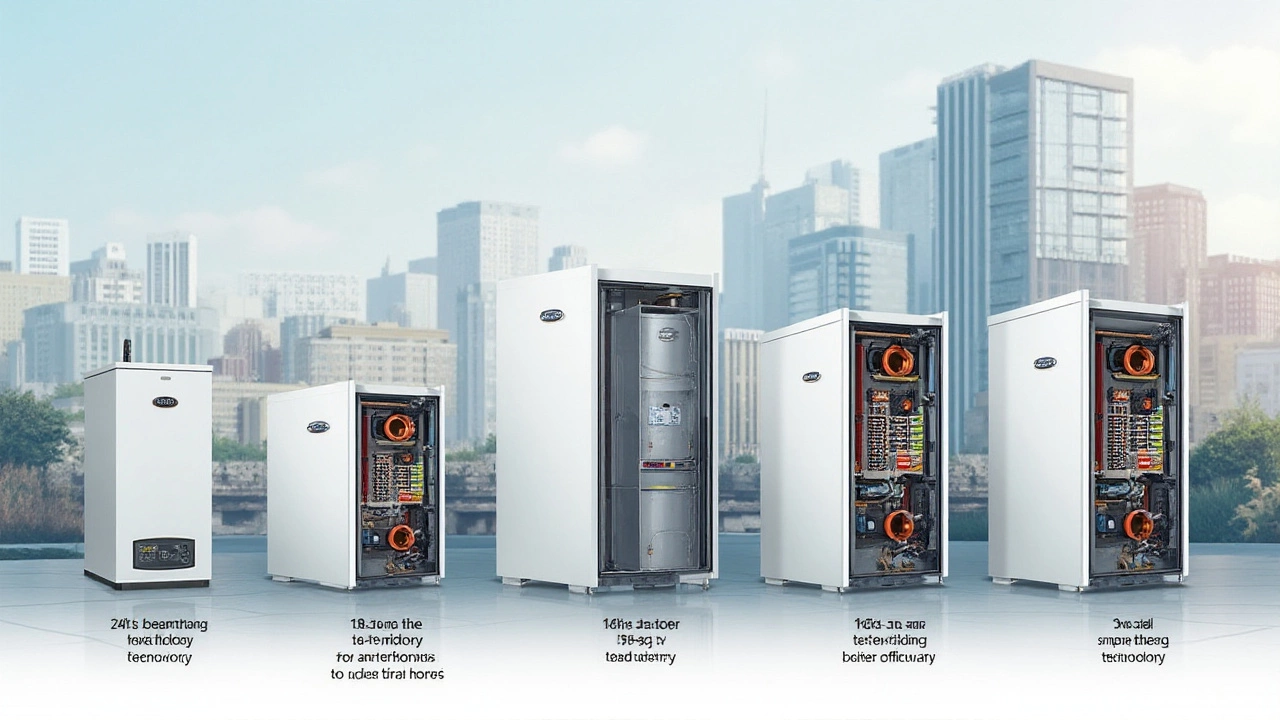When it comes to home heating, a reliable boiler is the unsung hero of comfort. As the years pass, even the most robust systems can start showing signs of wear, prompting many homeowners to consider whether it's time for a replacement. But is swapping out your old boiler really as daunting as it seems?
Boiler replacement isn't just a matter of hauling out the old model and plugging in a new one; it's a nuanced process that involves careful consideration of your home's unique needs and the options available on the market today. Whether you're dealing with constant breakdowns or just want to capitalize on modern efficiency, understanding your choices can lead to smarter investment.
Join us as we unravel the complexities of boiler replacement, offering insights and guidance to ensure your home stays warm and your wallet intact.
- When to Consider a Replacement
- Types of Boilers Available
- Understanding the Installation Process
- Maintenance Tips for Longevity
When to Consider a Replacement
Assessing whether to replace your boiler is not something most homeowners take lightly. It's a question layered with considerations, from efficiency to safety, and of course, cost. Often, the first indicator that you might need to consider a replacement is age. Boilers typically last between 10-15 years, which means that anything nearing or exceeding this lifespan might be functioning on borrowed time. With age comes inefficiency, which can quickly drain your energy budget. Yet, wear and tear aren't the only symptoms suggesting you need a new heating system.
Persistent and costly repairs are another sign. If you've been calling in the repairman almost as often as the seasons change, then it might be time to think about a new system. Focus on accumulative repair costs, too. If they surpass half the price of a new boiler replacement, a swap can be a financially sound decision. Hearing strange noises, like banging or gurgling, might charm you with their eerie presence, but they're usually not a good sign. Such sounds frequently point toward internal faults, indicating the end is nigh for your old system.
Sometimes, noticeable changes in your home's warmth can signal a need for replacement. Are you turning up the thermostat without success? Patchy heating distribution could mean your boiler is on its last legs. Also, if you're experiencing fluctuating water temperature while showering, this could be indicative of an impending boiler failure. A conversation with a trusted, local technician can illuminate central issues, providing a balanced perspective on whether repair or replacement aligns with your circumstances.
Efficiency might not always top the thoughts of homeowners, but it should. Advancements in technology have paved the way for boilers boasting up to 98% efficiency, as opposed to older models that rarely exceed 70%. If you're looking to reduce your home's carbon footprint or simply save on energy bills, upgrading to a modern boiler makes sense. The boiler repair industry is ripe with innovations that promise greener solutions, and it might just be time to seize them.
"Switching to a high-efficiency boiler could save homeowners hundreds, possibly thousands, on their annual heating bill," notes a study from the Energy Saving Trust. Their research underscores the economic advantages of newer, more efficient models, especially in areas with colder climates.
Home maintenance often requires juggling short-term inconveniences with long-term benefits. When it comes to replacing your boiler, understanding when it's time can make all the difference. A careful evaluation of its age, condition, and efficiency, coupled with professional advice, can guide this significant decision, ensuring warmth, comfort, and cost-effectiveness during the colder months.

Types of Boilers Available
When contemplating a boiler replacement, understanding the different types of boilers can be a significant determinant in your decision-making process. Each type of boiler has its own unique strengths and potential drawbacks, which may influence its suitability for your home. Boilers generally fall into four main categories: combi boilers, system boilers, conventional boilers, and condensing boilers. The combi boiler, also known as a combination boiler, is an increasingly popular choice among homeowners seeking both efficiency and convenience. This type of boiler doesn't involve a bulky water tank, which allows for smaller installation space compared to other types. They provide on-demand heating and hot water, making them ideal for those who value saving energy without sacrificing comfort. However, the flow rate might be a concern in larger homes where simultaneous use is frequent.
Let’s delve deeper into system boilers, which come equipped with a separate cylinder to store hot water. This can serve multiple taps at the same time without a drop in water pressure, which is why they’re a desirable option for larger households. Unlike the combi boiler, the system boiler does require more space due to the additional cylinder but doesn’t need a loft tank, which could be advantageous in homes where loft space is a commodity.
Conventional boilers, also known as regular, traditional, or open vent boilers, are ideally suited for homes that need a large supply of hot water. These boilers require both a hot water cylinder and a cold-water storage tank, which typically gets installed in the loft. If your existing heating system is connected to an old radiator system, a conventional boiler might be the natural choice to reduce disruption. But remember that installation and space considerations might make this a less attractive option for those with limited room.
Condensing boilers aren't a standalone category; rather, they describe a feature that any of the three previously mentioned boilers might have. Essentially, condensing boilers are highly efficient because they utilize the hot gases that would typically escape through the flue. A condensing boiler will convert almost all water vapor that escapes into heat, thereby increasing efficiency and saving money on energy bills. According to the Energy Saving Trust, upgrading to a condensing boiler could save you up to £200 per year in energy bills.
"A condensing boiler makes sense for both the environment and your wallet. Modern systems extract over 90% of the energy from the fuel they burn compared to older systems," shared energy expert Mark Green.Now, let's not overlook the importance of factoring in your household's specific heating needs and the implications of embracing modern technology. With energy-saving statistics like those above, your choice could significantly impact both comfort and savings.

Understanding the Installation Process
Replacing a boiler is no small feat—it's a multistep endeavor that requires careful planning, skilled hands, and a sprinkle of patience. The journey begins with selecting the right boiler replacement for your home. Homeowners must weigh factors such as the size of their residence, existing heating infrastructure, and future heating needs. Some might gravitate towards combi boilers for their compact nature, while others could favor traditional systems that accommodate larger spaces. The decision often comes after a detailed evaluation from a professional, who helps guide homeowners through the labyrinth of choices.
Once the selection is made, the actual installation needs to be meticulously planned. A qualified technician should be enlisted to disconnect and safely remove the old unit. It's not just about unplugging wires; the technician must ensure that gas lines are safely contained, water systems are properly drained, and any residual heat energy is safely dissipated. This part of the process is critical, as improper handling could lead to household hazards or ineffective heating down the line.
Post removal, the area where the new heating system will be installed has to be prepped. This includes checking the alignment of pipes, inspecting the integrity of connections, and ensuring that ventilation requirements are met. Ventilation is particularly crucial, as modern boilers often require specific configurations to operate efficiently and safely. Following this, the new unit gets installed, which includes firmly affixing it to prevent any movement and ensuring all connections are airtight to avoid leaks or gas emissions.
But the process doesn't end at installation. Thorough testing and configuration follow, ensuring the system runs effectively and optimally.
"A boiler installation is like an orchestra performance; it requires precision and harmony," a leading industry expert recently stated in the HVAC Journal. Tarnished by leakage or inefficiency, the entire symphony of home comfort falls silent.With everything in place, the technician will conduct a series of tests, including checking pressure levels, calibration of thermostats, and overall system responsiveness. This comprehensive test run guarantees that your newly installed boiler is ready to tackle the chilliest nights ahead.
Lastly, the installation process would not be complete without addressing the importance of proper documentation and guidance. The technician should provide a detailed manual, encompassing routine checks, maintenance tips, and troubleshooting advice. They should also explain any warranties or service agreements, so homeowners are fully aware of how to maintain their systems and receive any necessary service or replacement in the future. Embrace this knowledge, for it ensures that your new boiler serves you well for many years, efficiently keeping the frosty grip of winter at bay.

Maintenance Tips for Longevity
A crucial part of ensuring your boiler serves you well beyond its expected lifespan is adhering to a regular maintenance routine. Like any other home appliance, boilers require a steady amount of attention to prevent unexpected hiccups and to keep them running efficiently. Not only can this save you from costly repairs, but it also enhances the longevity of your heating system.
Regular servicing of your boiler is the cornerstone of its upkeep. Qualified heating engineers recommend that home and business owners book an annual service. During these evaluations, an expert will assess the efficiency and safety of your unit, checking components such as pressure levels, seals, and the integral flue. According to Bob Riley, a seasoned HVAC professional, "A little proactive maintenance goes a long way. It could mean the difference between a minor adjustment and a complete system failure."
He continues, "Annual checks are the golden standard—consider them as a health check-up for your heater – a tuned boiler is a happy boiler."
In addition to professional upkeep, there are simple steps homeowners can incorporate into their routine to contribute to the longevity of their heating system. Bleeding your radiators at least once a year helps maintain a balanced system by removing trapped air, which can impact the efficiency and warmth distribution throughout your home. This is a straightforward task that can prevent cold spots and reduce strain on your boiler.
Paying attention to your energy bills can also offer clues about your heating system's condition. Sudden increases in energy usage often hint at inefficiencies within your system, such as a struggling boiler that’s working overtime to meet your home's demands. If your payments are soaring without a plausible explanation, it might be time to reassess your boiler's performance.
Moreover, installing a magnetic filter is a worthy consideration for protecting the inner workings of your boiler by trapping sludge, rust, and other debris. In this way, your boiler remains in pristine condition, which has been shown to have significant impacts on system efficiency and durability. While this might involve a minor initial investment, the payoff in terms of maintenance and functionality is invaluable.
To visualize the importance of regular maintenance, here's a brief table summarizing potential savings and benefits:
| Maintenance Task | Benefit | Potential Savings |
|---|---|---|
| Annual Professional Service | Ensures efficiency and detects issues early | Up to 10% in annual energy costs |
| Radiator Bleeding | Improves even heat distribution | Reduces heating cycles by 5% |
| Magnetic Filter Installation | Protects internal components | Extends boiler life by 20% |
In conclusion, whether through expert servicing or manageable home interventions, taking a conscientious approach to boiler maintenance can secure a warm and worry-free environment while ensuring your heating system is a robust investment in comfort.
